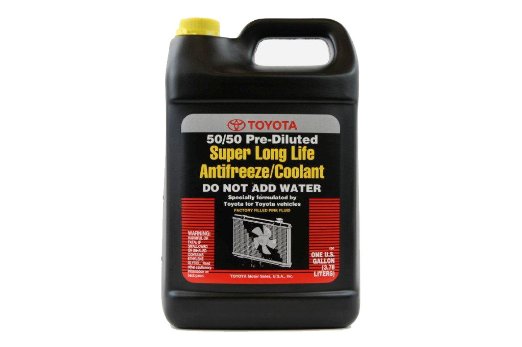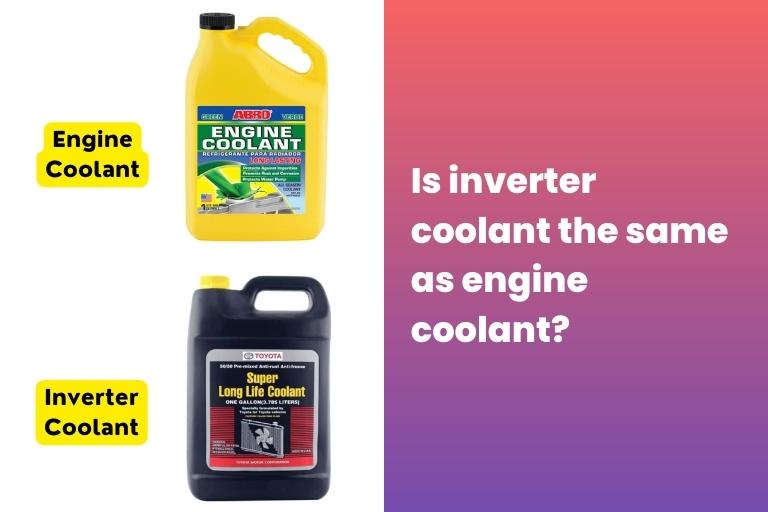As we all know, the engine is the heart of any vehicle, and ensuring it operates at the right temperature is essential to its longevity. This is where coolant comes in.
Coolant, also known as antifreeze, is a fluid that removes heat from the engine. It flows through the engine block and absorbs heat, then travels through the radiator, cooled by air flowing through the fins. This cooled liquid then returns to the engine to absorb more heat.
Different types of coolant are available in the market, and using the correct one for your vehicle is vital.
- Organic Additive Technology (OAT)
- Hybrid Organic Acid Technology (HOAT)
Properly maintaining your vehicle’s coolant system is crucial for ensuring the longevity of your engine and other cooling system components.
Contents
Is inverter coolant the same as engine coolant
No, an inverter coolant and an engine coolant are not the same. An engine coolant removes heat from the engine in a vehicle. In contrast, an inverter coolant is used to cool electronic components inside an inverter and protect the inverter from overheating. They are different types of coolant and are not interchangeable.
What is Inverter Coolant?

Inverter coolant is a coolant used in hybrid and electric vehicles to cool the electronic components inside the inverter. The inverter coolant is critical to the operation of the power electronics system in hybrid and Electric cars. The inverter turns direct current (DC) power from the battery into alternating (AC) power, which is then used to power the electric motor.
This conversion process generates a significant amount of heat, and the inverter coolant is used to remove this heat and keep the inverter operating at the correct temperature. The coolant circulates through the inverter by a pump, then flows through a radiator or heat exchanger to dissipate the heat into the air.
The inverter coolant also helps to protect the inverter from freezing in cold temperatures and prevents system corrosion and rust. In addition, the coolant also helps prevent condensation from forming inside the inverter and preventing electrical short circuits.
Moreover, the coolant helps to extend the life of the inverter by preventing damage due to overheating. Overall, the inverter coolant plays a crucial role in the power electronics system of a hybrid or electric vehicle, and its maintenance is vital to ensure the proper functioning and longevity of the vehicle.
Inverter coolant typically has the following characteristics:
- High thermal conductivity
- Low freezing point
- Low viscosity
- Good heat dissipation
- High boiling point
- Good corrosion resistance
- High electrical insulation
- High stability
- Non-toxic and biodegradable
What is Engine Coolant?

Engine coolant, also known as antifreeze, is a liquid used to remove heat from the internal combustion engine in a vehicle. It circulates through the engine block, absorbing heat, then travels through the radiator, cooled by air flowing through the fins. This cooled liquid is recycled back into the engine to absorb more heat.
Engine coolant’s principal job is to absorb and transmit heat away from the engine, keeping the engine at its ideal operating temperature.
The water pump flows coolant via the engine and then through the radiator, where it is conditioned by the air passing through it. This procedure aids in the prevention of engine overheating, which can cause damage and limit efficiency.
In addition, engine coolant keeps the engine from freezing in cold weather. This is especially critical in locations prone to harsh winter weather. Some coolant formulations include corrosion blockers to protect the engine from rust and other types of damage.
This can help prolong the engine’s life and prevent costly repairs. Overall, engine coolant is an essential component of any internal combustion engine, and regular maintenance, including coolant replacement, is necessary to ensure its proper functioning.
Engine coolant typically has the following characteristics:
- High thermal conductivity
- Low freezing point
- Low viscosity
- Good heat dissipation
- High boiling point
- Good corrosion resistance
- Non-toxic and biodegradable
Comparison of Inverter and Engine Coolant
| Inverter Coolant | Engine Coolant | |
| Definition | Coolant used in inverters to cool electronic components | Coolant used in internal combustion engines to remove heat |
| Function | Remove heat from inverter | Remove heat from engine and protect it from freezing, rust and corrosion |
| Composition | Often a mixture of water and organic acid inhibitors | Often a mixture of water and ethylene glycol or propylene glycol |
| Properties | High thermal conductivity, low freezing point, low viscosity, good heat dissipation, high boiling point, good corrosion resistance, high electrical insulation, high stability, non-toxic and biodegradable | High thermal conductivity, low freezing point, low viscosity, good heat dissipation, high boiling point, good corrosion resistance, non-toxic and biodegradable |
| Compatibility | Recommended for use in hybrid and EVs | Recommended for use in internal combustion engines |
Similarities:
- Both types of coolant have high thermal conductivity, low freezing point, low viscosity, good heat dissipation, high boiling point and good corrosion resistance.
- Both types of coolant are non-toxic and biodegradable.
Differences:
- Engine coolant is used in internal combustion engines, while inverter coolant is used in inverters of hybrid and electric vehicles.
- Engine coolant also protects the engine and other cooling system components from freezing, rust and corrosion, while inverter coolant has high electrical insulation and stability.
The compatibility of inverter coolant and engine coolant with different vehicle systems depends on the specific type of vehicle.
In hybrid and electric vehicles, inverter coolant is typically recommended for use in the inverter system. These vehicles have electric motors that generate a lot of heat, and the inverter coolant is designed to effectively remove this heat and protect the electronic components inside the inverter.
In internal combustion engines, engine coolant is typically recommended. These engines generate a lot of heat, and the engine coolant is designed to effectively remove this heat and protect the engine from overheating and freezing. The engine coolant protects the engine and other components from rust and corrosion.
You May Also Like the following:
- Why Coolant is Coming Out of the Radiator Cap When Removed?
- 9 Signs You Need a Coolant Flush
- Can Low Coolant Level Cause a Check Engine Light?
- Why Is the Air Compressor Pushing Coolant Out?
- Coolant Under Pressure When Cold
- Coolant Coming Out of the Overflow
- Can You Put Ice in Your Coolant?
- What Happens if You Don’t Flush Coolant?
- Can Coolant Flush Cause Leaks?
- No Coolant in the Radiator, but Reservoir Tank is Full
- Do Cars Lose Coolant Over Time?
- Coolant Coming Out of the Radiator Cap When Removed
- Does Coolant Evaporate?
FAQs
Is Inverter Coolant the Same as Antifreeze?
Inverter coolant and antifreeze are not the same, although inverter coolant may contain antifreeze components. Inverter coolant is specially designed for cooling the inverter system in hybrid vehicles, which converts direct current (DC) to alternating current (AC). In contrast, antifreeze or engine coolant is primarily aimed at maintaining the engine’s temperature within optimal ranges.
Is Prius Inverter Coolant the Same as Engine Coolant?
The Prius inverter coolant and engine coolant are not the same. The inverter coolant cools the heat generated by the operations of the semiconductor inverter as it translates DC to AC. In contrast, the engine coolant regulates the engine temperature levels to prevent overheating. It’s worth noting that the Generation II Toyota Prius has two distinct cooling systems for the engine and the inverter, each with its designated coolant.
What Is Hybrid Inverter Coolant?
Hybrid inverter coolant is a specific type used in hybrid vehicles to manage the heat generated by the inverter, which handles the hybrid operation of converting DC to AC. The inverter coolant circulates using a liquid cooling loop, taking the excess heat to the radiator to be dissipated. The composition of a hybrid inverter coolant might include a mixture of antifreeze and distilled water, similar to engine coolant. Still, its exact formulation can vary, and it’s always advisable to use the specific type of coolant recommended by the vehicle manufacturer.
Conclusion
In conclusion, using the correct type of coolant for specific vehicle systems is crucial for the proper functioning and longevity of the vehicle. Inverter coolant is designed to remove heat and protect electronic components in hybrid and electric vehicles.
In contrast, engine coolant is designed to remove heat and protect internal combustion engines and other cooling system components from freezing, rust, and corrosion.
Regular checks and maintenance of the coolant level and system are vital to prevent coolant leaks and overheating, which can lead to costly repairs. See the vehicle owner’s handbook or a professional technician for the necessary service intervals and maintenance methods.
If you need more clarification about the type of coolant your vehicle requires or if you notice any issues with your vehicle’s cooling system, it is best to consult a professional mechanic to diagnose and fix the problem.
